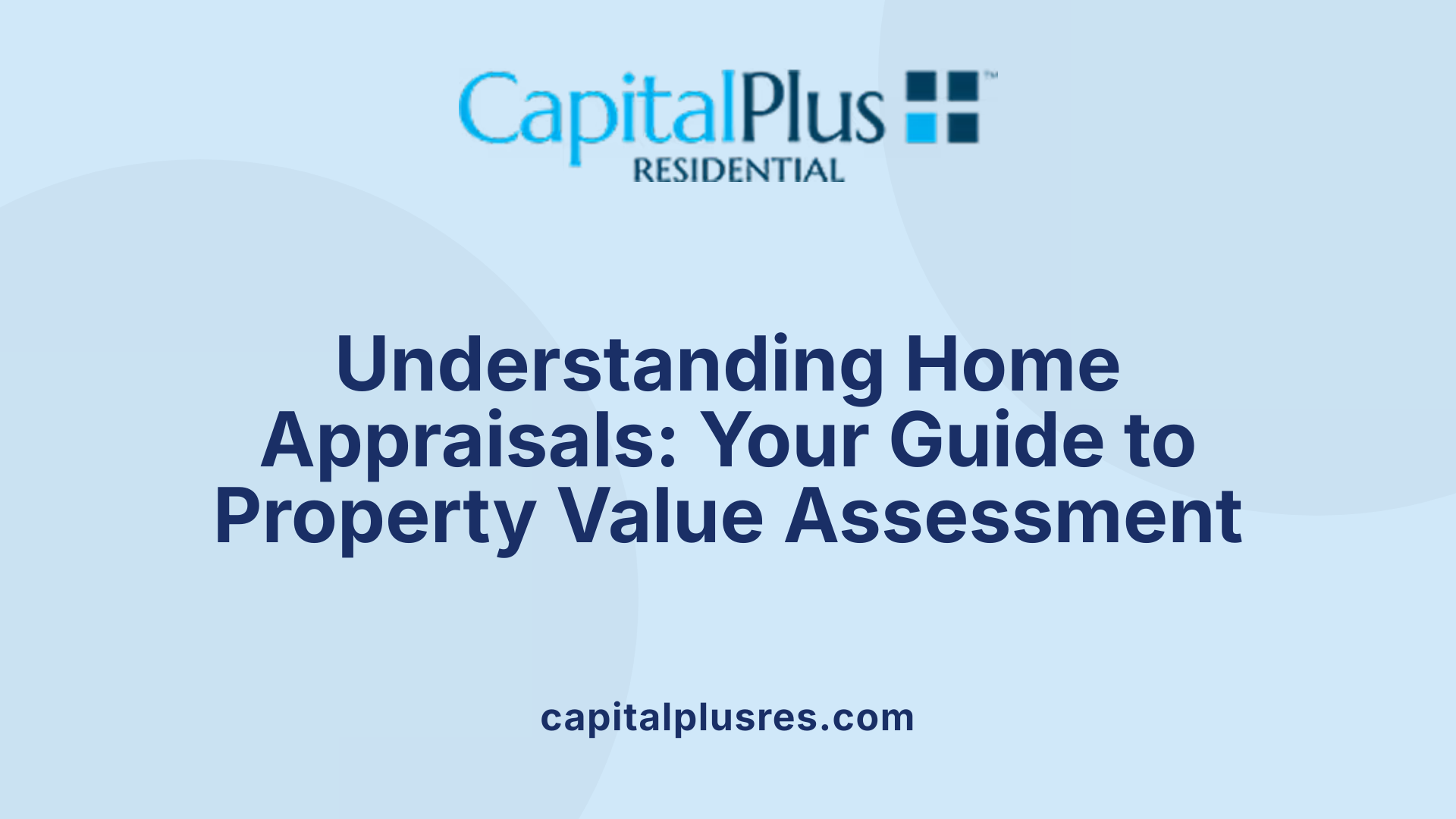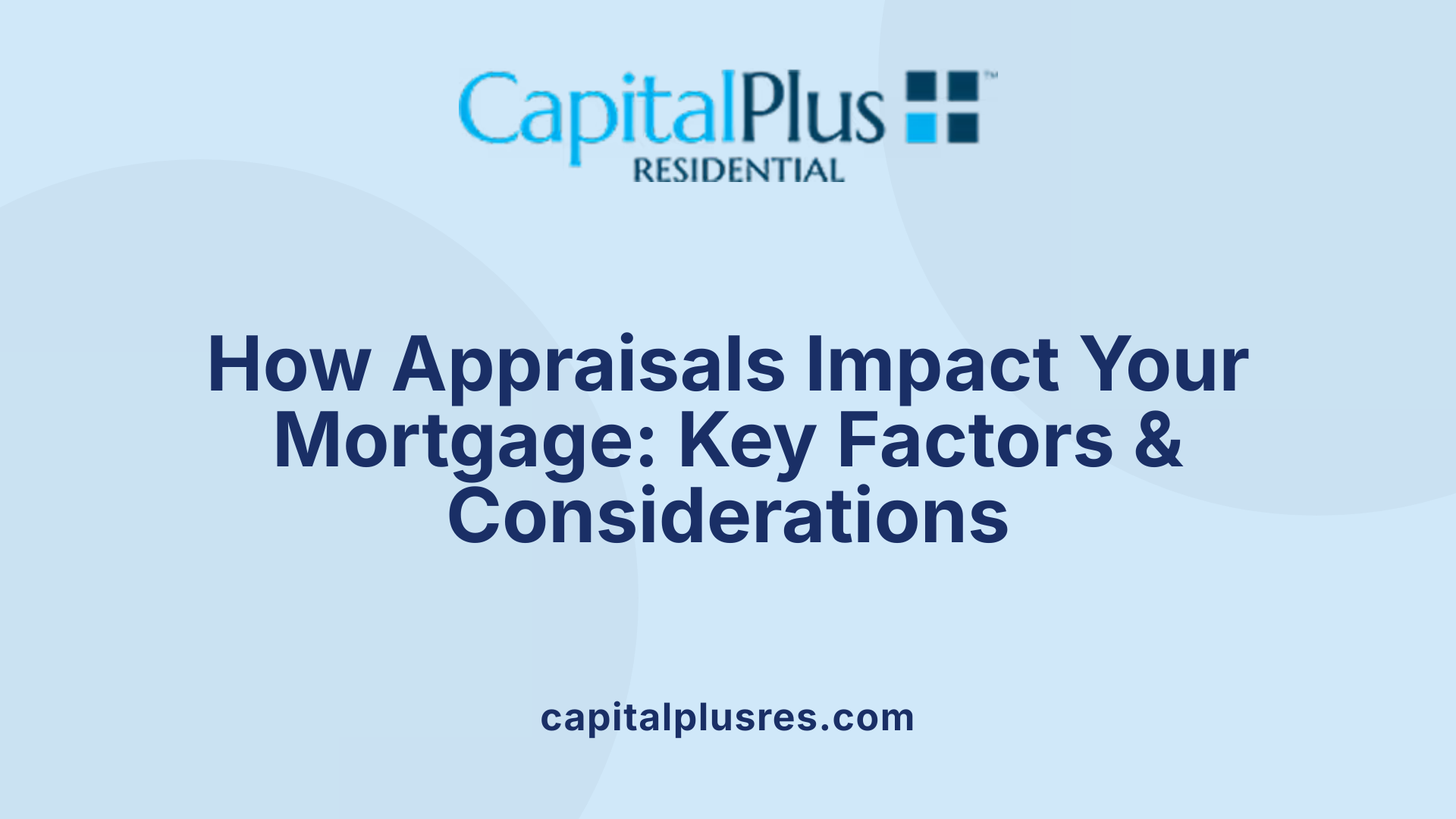Understanding the Importance of Appraisals in Home Financing
Navigating the mortgage process can be complex, but one crucial step that often defines the direction of home financing is the property appraisal. This professional assessment provides an unbiased estimate of a home's value, playing a pivotal role in mortgage approval. By exploring how appraisals impact lending decisions, homeowners and buyers can better understand their importance and prepare accordingly.
What Is a Home Appraisal and Why Does It Matter?

What Is a Home Appraisal?
A home appraisal is a professional assessment performed by a licensed appraiser to estimate a property's market value. This impartial evaluation is crucial during the mortgage process to ensure that the property's worth aligns with the loan amount being requested.
Who Conducts the Appraisal?
Licensed appraisers, qualified professionals trained to provide unbiased property valuations, carry out the appraisal. Their expertise helps lenders and buyers gain a clear understanding of a home's value.
What Factors Influence the Appraisal Value?
Appraisers consider multiple elements, including the home's location, size, age, condition, amenities, and recent sales of comparable properties (known as "comps"). They also account for current market conditions, which affect property values at the time of the appraisal.
Why is the Appraisal Considered Unbiased and Professional?
The appraisal process is designed to be objective and based on factual data. Independent appraisers rely on standardized methods and verified sales data, minimizing the risk of inflated or undervalued estimates. This helps protect both lenders and buyers from financial risk.
How Are Comparable Sales and Market Conditions Used?
By analyzing recent sales of similar homes nearby, appraisers establish a fair market value. This "sales comparison approach" reflects real market activity trends, ensuring the appraisal is relevant and accurate, even though it primarily looks at past data to predict value.
Together, these factors ensure the appraisal provides a trustworthy value estimate that supports sound lending decisions and fair property transactions.
Appraisals and Their Influence on Mortgage Approval and Terms

How do appraisals affect loan amount?
An appraisal provides a professional estimate of a property's market value. This value guides lenders in determining the maximum loan amount they are willing to offer. Essentially, the loan amount is capped by the lower of the purchase price or the appraised value, ensuring the lender only finances what the property is worth.
What is the relationship between appraised value and loan-to-value ratio (LTV)?
The appraised value directly influences the Loan-to-Value Ratio (LTV), which compares the loan amount to the property's value. A higher appraised value lowers the LTV, reducing the lender's risk. Conversely, a lower appraisal increases the LTV, potentially making the loan riskier and triggering stricter lending terms.
How does appraisal impact mortgage insurance requirements?
Appraisal values affect mortgage insurance needs. When the LTV is high due to a lower appraisal, lenders often require mortgage insurance to protect against default. If an appraisal confirms a higher market value, the LTV is lowered, potentially helping borrowers avoid costly mortgage insurance premiums.
What is the connection to mortgage interest rates and loan terms?
A strong appraisal that supports or exceeds the purchase price improves a borrower's leverage for better loan terms and interest rates. Lenders view the loan as less risky, which can translate into lower interest rates and more favorable terms. Lower appraised values may result in higher rates or additional borrower requirements.
What are the consequences of an appraisal lower than the purchase price?
When the appraisal falls short of the purchase price, the loan amount is usually limited to the appraised value. This discrepancy can prompt renegotiation between buyer and seller, require the buyer to increase their down payment, or lead to an appraisal contingency being exercised. Sometimes, buyers may seek a second appraisal or challenge the report, but this process can be complex and uncertain.
| Aspect | Impact of Appraisal Value | Explanation |
|---|---|---|
| Loan Amount | Limited to appraised value if lower than purchase price | Ensures loan corresponds with actual property value |
| Loan-to-Value Ratio (LTV) | Directly affected by appraisal value | Determines lender's risk and loan terms |
| Mortgage Insurance | Required if LTV is high due to low appraisal | Protects lender from default risks |
| Mortgage Interest Rates | Lower appraisal may increase rates; higher appraisal lowers them | Reflects loan risk and borrower’s equity |
| Mortgage Approval Process | May be delayed or require renegotiation if appraisal is low | Involves additional steps like negotiation or second appraisal |
Risk Management for Lenders and Protection for Buyers

How Do Appraisals Serve as Risk Mitigation Tools in Mortgage Lending?
An appraisal is more than just an estimate of a property's worth; it acts as a vital risk mitigation tool for lenders. By providing an unbiased and professional assessment of the home's market value, appraisals ensure that lenders do not approve loans exceeding the actual worth of the collateral. This reduces financial exposure if the borrower defaults. The appraisal ensures the loan amount aligns with the property's value, thus protecting lenders from lending more than the home is worth.
How Do Appraisals Ensure Loan Amounts Align with Collateral Value?
Lenders use appraisal reports to determine the loan-to-value ratio (LTV), which is the loan amount divided by the appraised property value. A lower LTV ratio means less lending risk and can lead to better mortgage terms for borrowers. If the appraisal comes in lower than the purchase price, the loan amount is typically capped at the appraised value, preventing lenders from overextending credit.
How Do Appraisals Protect Buyers from Overpaying?
Appraisals provide homebuyers with an impartial estimate of the home's market value, helping them avoid overpaying in competitive markets. If the appraisal is below the purchase price, buyers have options such as renegotiating the price, increasing their down payment, or requesting a second appraisal. This process protects consumers from inflated prices and supports fair transactions.
What Is the Significance of Property Condition in Appraisals?
The appraisal includes a thorough assessment of the property's condition. Structural issues or necessary repairs discovered during the appraisal may need to be addressed before mortgage approval. This condition appraisal ensures lenders do not finance properties with significant hidden defects and buyers are aware of potential repair costs.
How Do Market Fluctuations and Timing Affect Appraisal Reliability?
Appraisals reflect property values at a specific moment, based on recent sales data and market conditions. Because the real estate market constantly fluctuates, appraisal values are backward-looking and can vary with timing and appraiser judgment. Such variability can impact mortgage approval timelines and loan terms if the market shifts between contract and closing.
Challenges and Solutions When Appraisals Come in Low

Reasons for appraisal discrepancies
Appraisal values can vary due to timing, differences between appraisers, and shifting market conditions. Since appraisers rely heavily on recent comparable sales (comps), which reflect past transactions, the evaluation is somewhat backward-looking and may not capture current market trends perfectly.
Impact of low appraisals on mortgage process
A low appraisal can disrupt the mortgage approval process because lenders base their loan amount on the appraised value rather than the purchase price. If the appraisal comes in below the offer, the mortgage amount is typically limited to the lower figure, potentially causing delays or forcing buyers to increase their down payment.
Available options to address low appraisal values
Buyers have several options when facing low appraisals:
- Review and challenge the appraisal report: Submit recent comparable sales or evidence that may have been overlooked.
- Request a second appraisal: Though this usually requires the buyer to pay the additional fee.
- Renegotiate the purchase price: Sellers might agree to lower the price to match the appraisal.
- Split the difference: Both buyer and seller share the cost difference.
- Increase down payment: Buyers can compensate for the gap by paying more upfront.
- Exercise appraisal contingencies: These provisions allow buyers to back out or renegotiate if the appraisal is low.
Renegotiation, second appraisal, and appraisal contingencies
Renegotiation can be the quickest way to salvage a deal, but it requires seller cooperation. Requesting a second appraisal may offer a higher valuation but comes with additional costs and is not guaranteed to produce a better result. Appraisal contingencies in purchase contracts provide protection for buyers, giving them flexibility if the appraisal is unfavorable.
How homebuyers can contribute to positive appraisal outcomes
Homebuyers can assist the appraisal process by maintaining their property in good condition, providing the appraiser with a list of recent upgrades, and supplying relevant information about the neighborhood and comparable sales. This proactive approach can help appraisers arrive at a fairer value and reduce the risk of surprises during the mortgage approval process.
The Appraisal Process and Consumer Rights

Order and conduction of appraisals by lenders
Lenders typically order a professional home appraisal after a property is under contract to determine its market value. This process helps them ensure that the loan amount they provide is supported by the property's worth, mitigating financial risk.
Appraiser qualifications and professionalism
Appraisals must be conducted by licensed, qualified, and designated appraisers who carry out an unbiased and thorough property assessment. This professionalism helps maintain accuracy and integrity in the valuation.
What appraisal reports include
An appraisal report details a comprehensive description of the property, analysis of its highest and best use, recent comparable sales (comps), market trends, and the appraiser’s final value estimate. These elements support lenders in evaluating the loan's risk.
Consumer rights to receive appraisal report
Homebuyers are entitled to receive a copy of the appraisal report, usually at least three days before closing. This transparency allows consumers to review the valuation thoroughly and understand the basis for loan approval or terms.
Regulations preventing lender interference
Current regulations prohibit lenders from directly contacting appraisers, reducing the chance of pressure to inflate values. This separation ensures that appraisals remain impartial and reliable.
Cost considerations and timelines
The cost for a standard home appraisal generally ranges from $300 to $500. If the report finds structural or other issues requiring repairs, additional expenses may be incurred before mortgage approval. The timing from appraisal to receiving the report typically fits within the mortgage approval period to avoid delays.
Appraisals: A Cornerstone of Responsible Mortgage Lending
Property appraisals serve as a fundamental checkpoint in the mortgage approval process, balancing the needs and risks for both lenders and buyers. By providing an impartial estimate of a home's value, appraisals help ensure loan amounts are justified and protect buyers from overpaying. Understanding the appraisal process, its influence on loan terms, and ways to address challenges empowers prospective homeowners to approach mortgage financing with greater confidence and clarity.









